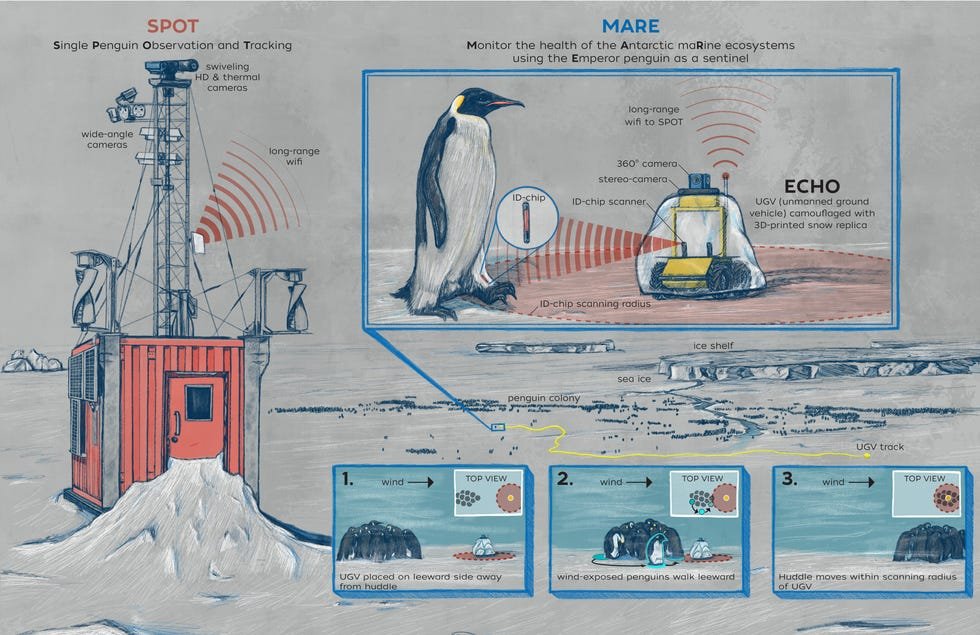This Research Robot is Living Amongst Penguins in the Antarctic
Researchers at Antarctica’s Atka Bay are studying a colony of around 20,000 emperor penguins with the help of a small, yellow robot called ECHO.
Credit: Daniel Zitterbart/Woods Hole Oceanographic Institution
Deep in the Antarctic, silently watching Atka Bay’s emperor penguin colony is an unlikely outsider. The bright yellow, remote-controlled robot named ECHO observing the penguins’ every move may stick out like a sore thumb at first glance, but in reality, he could be a vital tool for researchers measuring the health of the Antarctic marine ecosystem.
The two-foot-tall robot is part of a 30-year program by researchers at the Marine Animal Remote Sensing Lab (MARE) that began in 2017. The project, funded by the Woods Hole Oceanographic Institution (WHOI) in Massachusetts, aims to examine the birds to learn more about how climate catastrophe could be impacting animals in the Antarctic. As top predators and therefore sentinel species - species that are highly sensitive to environmental disturbance - emperor penguins are an ideal candidate for the study.
"We all know that the world is changing, and that change will have dramatic effects on biodiversity and on ecosystems, especially in very remote areas, like Antarctica," says Daniel P. Zitterbart, a researcher at the Marine Animal Remote Sensing Lab to Popular Science. "To understand if that's true or not, we need to start monitoring those systems very closely now."
Credit: Woods Hole Oceanographic Institution
The severe, unpredictable weather conditions and tough habitat of the Southern Ocean have made studying penguin colonies difficult. ECHO allows scientists to collect data and readings on these ecosystems in real-time, all year round, without introducing a potentially stressful, human presence into the birds' lives.
"The really cool thing is if I as a human would try to get as close as ECHO, they would be running away," said Zitterbart. "We don't want to scare the animals. Our general aim is to do more science with less impact. And humans have a much bigger impact on the animals than the robot actually has."
To gather the information, researchers tag around 300 chicks each year using a Passive Integrated Transponder (PIT) and Radio-Frequency Identification (RFID) system - similar to the kind of microchip used to keep track of cats and dogs. These systems allow for remote monitoring of the penguins, but they can only be read from a few meters away. ECHO, fitted with wireless receivers, can get close enough to the penguins to pick up the data, which is then transmitted back to the research team.
“The amount of data we can gather through ECHO is something we would never be able to achieve with any other method in this place,” added Zitterbart.
Credit: Woods Hole Oceanographic Institution
A review led by international experts concluded that emperor penguins could be extinct by the end of this century, with 70 percent of colonies wiped out by 2050.
Credit: Woods Hole Oceanographic Institution
The problem centers around the penguins' reliance on sea ice, which is being lost on an unprecedented scale due to rising greenhouse gas emissions. Emperor penguins need the sea ice for breeding, feeding, and for their annual molt. “To understand if that’s true or not, we need to start monitoring those systems very closely now,” said Zitterbart.
We Have A Favor To Ask…
Species Unite amplifies well-researched solutions to some of the most abusive animal industries operating today.
At this crucial moment, with worldwide momentum for change building, it’s vital we share these animal-free solutions with the world - and we need your help.
We’re a nonprofit, and so to keep sharing these solutions, we’re relying on you - with your support, we can continue our essential work in growing a powerful community of animal advocates this year.
More stories:
Species Unite
A collection of stories of those who fight the good fight on behalf of animals.







A new study has revealed a landmark process that can now create bigger pieces of whole meat - without needing to farm an animal.